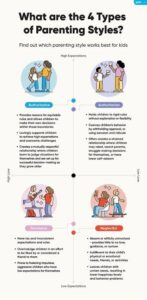

Parenting and child development:
 Supporting Child Development
Supporting Child Development
Early Years (0-5 years): Emphasize the importance of nurturing environments, responsive caregiving, and age-appropriate stimulation to support cognitive, social, and emotional development.
Middle Childhood (6-12 years): Discuss the role of structured activities, fostering independence, and encouraging exploration to build confidence and skills.
Adolescence (13-18 years): Highlight the significance of providing guidance while respecting autonomy, discussing life skills like decision-making and managing emotions.
Positive Parenting Techniques:
Effective Communication: Stress the importance of active listening, validating feelings, and using clear, respectful language to promote healthy parent-child relationships.
Positive Reinforcement: Encourage the use of praise and rewards for desirable behaviors, reinforcing positive actions rather than focusing solely on disciplining negative ones.
Setting Boundaries: Discuss the necessity of consistent and age-appropriate rules, explaining consequences calmly and ensuring they are fair and reasonable.
Addressing Behavioral Issues:
Understanding Behavior: Educate parents on the developmental reasons behind behaviors, such as tantrums or defiance, and how to respond with patience and empathy.
Problem-Solving Approach: Advocate for problem-solving discussions rather than punitive measures, involving children in finding solutions to conflicts or challenges.
Seeking Support: Guide parents on when to seek professional help, such as for persistent behavioral issues or emotional difficulties that may require specialized intervention.

Navigating Challenges of Different Stages:
Transitions: Offer strategies for managing transitions such as starting school, moving to a new environment, or dealing with peer pressure during adolescence.
Peer Relationships: Provide guidance on helping children build healthy friendships, navigate conflicts, and develop social skills crucial for positive interactions.
Parental Self-Care: Stress the importance of self-care for parents, ensuring they have the emotional resilience and support networks necessary to navigate parenting challenges effectively.
Conclusion:
Empowerment: Encourage parents and caregivers to trust their instincts, seek knowledge, and adapt strategies based on their child’s unique needs and personalities.
Continuous Learning: Highlight the ongoing nature of parenting, where learning and adapting are key to fostering a supportive and nurturing environment for children.
Applying positive parenting techniques, addressing behavioral challenges, and navigating the complexities of different stages of childhood and adolescence.
Sushma Kaushik

